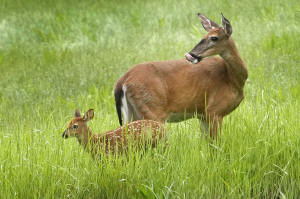Maine asks hunters to avoid eating deer, turkey in some areas because of
PFAS contamination
 Send a link to a friend
Send a link to a friend
 [October 29, 2024]
By PATRICK WHITTLE [October 29, 2024]
By PATRICK WHITTLE
PORTLAND, Maine (AP) — Maine's traditional fall hunting seasons are in
full swing, but hunters are being asked to avoid eating their game in
parts of the state because of the possibility of harmful chemicals in
animal meat.
Hunters from around the Northeast trek each autumn to Maine, where deer
and wild turkeys are two of the most popular game animals. The Maine
Department of Inland Fisheries and Wildlife said it has issued a “do not
eat wildlife consumption advisory” in several communities in the central
part of the state.
The department said in a statement that it sampled wildlife in the area
and found they had levels of PFAS in their muscle tissue that warranted
the advisory. PFAS, or per- and polyfluoroalkyl substances, are
chemicals that persist in the environment and are linked to human health
problems including cancer and low birth weight.
“The advisory areas encompass areas that have been contaminated by high
levels of PFAS through the spreading of municipal and/or industrial
sludge that contained PFAS. Deer and turkey feeding in these
contaminated areas have ingested these chemicals and now have PFAS in
their meat and organs,” the department said Thursday.
The advisory covers portions of Unity, Unity Township, Albion and
Freedom, in addition to existing advisory areas in Fairfield and parts
of Skowhegan, the department said. The department said it based the
advisory on the testing of 54 deer and 55 turkeys for the presence of
PFAS. The advisory arrived not long before the state's popular “resident
only day” for deer hunters on Nov. 2.
[to top of second column]
|

A whitetail doe and her fawn keep an eye out from a field, in this
June 14, 2023, file photo in Freeport, Maine. (AP Photo/Robert F.
Bukaty, file)
 It's unknown how long the advisories
will stay in place. The department said New Hampshire, Michigan and
Wisconsin have also issued consumption advisories regarding PFAS and
deer.
Maine was one of the first states to detect PFAS in deer. The
presence of the “forever chemicals” in wildlife and fish has been
increasing as a focus for public health regulators in recent years.
PFAS substances have long been used in household products such as
non-stick cookware and food packaging. The chemicals are also used
in firefighting foams and appear in some fertilizers. Federal
authorities have also taken actions to try to limit PFAS pollution
amid concerns about the substances appearing in food, drinking water
systems and private wells.
All contents © copyright 2024 Associated Press. All rights reserved
 |